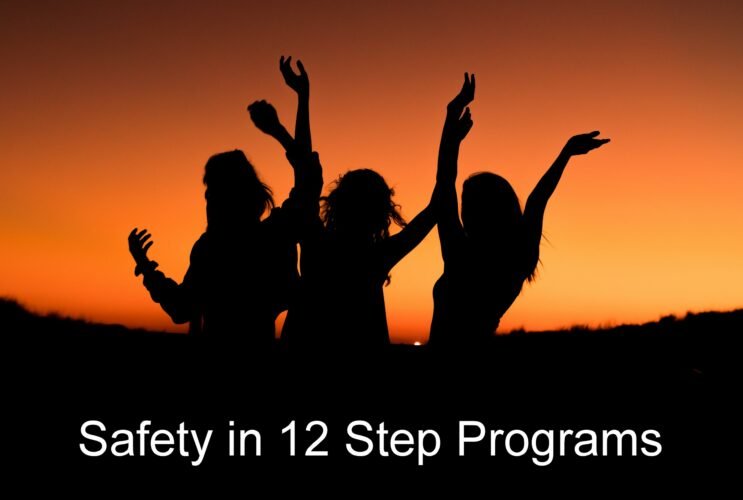Safety in 12 Step Programs
Home » 12 Step Programs » Safety in 12 Step Programs
Key Takeaways
Concerns regarding safety and anonymityAlcoholics Anonymous and all the 12 step groups modeled after it, protect the anonymity of its members. Members are forbidden from disclosing the identity of other addicts to outside sources or identifying themselves with the group on any form of public media. The idea behind this is to focus on the… are valid:
- Sharing12-step meetings are structured so that member sharing takes up most of the allotted time. It is the bread and butter of the fellowship between members. When sharing, addicts are encouraged to stay on topic and avoid interrupting by engaging in crosstalk. personal information and receiving support involves disclosing personal details.
- RecoveryThe process by which addicts attempt to break the hold a certain substance or behavior has on their lives. This can refer to participation in a wide variety of methods. What they all have in common, is a sense that life is improving and the addict is regaining control. groups are not immune to societal problems like stalking, threats, and intolerance.
- Unwanted advances, particularly towards women, are a prevalent issue (“13th Stepping“).
StepsThe term “12 steps” refers to the core principles of the approach to addiction exemplified by Alcoholics Anonymous and other similar groups. The 12 steps are a set of guidelines designed to help individuals overcome addiction and rebuild their lives. They were created by the founders of Alcoholics A… to ensure your safety:
- Be assertive and seek support from trusted members if you feel threatened.
- Group members prioritize the safety and well-being of the group above individuals.
- Don’t hesitate to involve authorities if the group fails to address serious issues.
Group responsibility and action:
- Responsible groups establish safety protocols and address disruptive behavior.
- Warnings, temporary exclusions, and even legal action are acceptable measures to protect the group.
- Anonymity doesn’t shield criminal or inappropriate behavior.
Additional considerations:
- Prepare for physical emergencies like fires or natural disasters.
- Trust your judgment and common sense, informed by the 12-Step Traditions.
- Remember, the fellowshipThis refers to the members of AA and the bonds of support between them. It is this fellowship that allows addicts to share their stories and accept each other in a world that is not always understanding. exists to help you and should protect you. Seek help if problems arise.
Staying Safe in 12-Step Programs
Initial Concerns and Trust Issues
Until you get your bearings, when attending your first few meetings, it’s not uncommon to be hesitant and feel concerned about your safety. After all, you will be divulging some of your most sensitive secrets to a group of strangers. Besides, receiving support from the group involves giving out and receiving telephone numbers and identifying information.
Sure, the groups usually have the word anonymous in their name, but what if the trust is violated? Is our information safe? Though we are also addicts, we may be concerned about the behavior of others less in control of their impulses than ourselves. What can you do to keep yourself safe in twelve-step programs?
Challenges Within Recovery Groups
These fears are reasonable. After all, recovery groups are part of the societies they stem from and will have their share of all the same problems. Despite our shared commitment to recovery, there have been reports of all of our social maladies in 12-step groups: stalking; threats of violence; racial intolerance; sexual orientation, or gender identification intolerance. Members have also reported facing pressure to adopt political or religious views they vehemently disagree with.
Inappropriate Behavior and Its Consequences
Perhaps the most problematic behavior members engage in is inappropriate or predatory behavior which targets vulnerable members of the fellowship. The most common form of activity involves men displaying a sexual interest in female members. This is so common, that some have referred to it as Thirteenth Stepping. While usually, the interest expressed is within bounds, sometimes it crosses lines. Even when women are approached respectfully, it can distract from recovery and healing and is therefore detrimental to the recovery of some.
This problem has been known to keep some women away from meetings. This is a serious problem for the person in question. However, it is also an issue of importance to the group, as it undermines the main role of the group: to assist addicts in need of recovery. Too many people, mostly but not only women, have been driven away from or retraumatized by the only fellowship to which they have access.
Responding to Threats and Predatory Behavior
If a threat arises at a meeting, you must take immediate steps to scare away a possible predator. Surround yourself with other people as quickly as possible. Large numbers are not conducive to sexually threatening behavior. Tell members you trust about the problem right then and there. Have someone walk you to your car or drive you home. Most importantly, to not give any individual you are concerned about time alone with you. It is important to nip these problems in the bud.
Group Autonomy and Dealing with Disruptions
If you bring up the problem with other members of the group, they should take immediate steps to protect you. Sometimes, this can be a bit difficult.12-step programs are intentionally structured autonomously and with little hierarchical oversight. There is no disciplinary or legal forum within the organization to deal with threats and problems as they arise. There is also no limitation on membership. The guidelines of most fellowships call for the acceptanceAccepting an inability to cope with addiction alone, is a major part of the recovery process. The same process involves accepting our flaws, responsibility for our actions, and the need to surrender to a Higher Power. of anyone who needs help with their addiction. Therefore, it is up to each group to maintain its security.
Group Welfare vs. Individual Rights
However, 12-step programs put the welfare of the group ahead of the needs of the individual. The welfare of the individual is often considered to be a “close second” behind the welfare of the group. Indeed, many of the fellowships explicitly state the importance of putting “principles before personalities.” If one individual is regularly or seriously disrupting the group in its efforts to facilitate recovery, the problem must be dealt with efficiently and swiftly.
Variability in Group Responses
Due to the decentralized structure of AA, some groups take these problems very seriously, while others do not. In some groups, warnings that illegal and disruptive behavior will not be tolerated are read regularly. In others, the issue never arises.
Approaches to Problematic Members
When faced with problematic members, groups often discuss the issue ad-hoc and seek appropriate remedies. Usually, a problematic memberAn individual who attends 12-step program meetings and has the desire to overcome addiction. receives a warning from senior members of the group. In more extreme cases, disruptive members may be asked to cease attending meetings for a circumscribed period. When necessary, members may call the appropriate authorities so they may address the problem.
Dealing with Disruptive or Illegal Activity
What should you do if targeted by disruptive or illegal activity? If you are facing a moderate threat, inform other members of the group of your concerns. The members are duty-bound to create an environment that is safe and facilitates your recovery.
Anything that happens within a meeting is within the jurisdiction of local law enforcement. Therefore, and any activity within an A.A. meeting is subject to the same laws that apply outside the meeting. Therefore, if the problem is severe or the members of your group are unable or unwilling to address it, you are fully within your rights to contact law enforcement.
Physical Security and Contingency Plans
Meetings can also be vulnerable to the same physical threats as any group of people. Whether it be fires, extreme weather, flooding, or earthquakes, these may occur during meetings. A responsible group should set up contingency plans for emergencies in cooperation with the owners of the meeting place and local police and fire-fighters. If concerned about this issue, enquire with veteran group members.
Prioritizing Safety in Recovery
If there are no contingencies in place, make sure that the problem is rectified. Remember, your physical security is more important than the meeting. Stop the meeting and act by following security instruction immediately, if there is even a hint of a threat to your physical security. Rather than strict dogma, Good judgment and common sense, informed by the Twelve Traditions, seem to provide the best guide.
Even if some members are disruptive or threaten members of the group, remember that the fellowship exists to help you and is duty-bound to protect you. They should help you solve any problems that arise. If they do not, approach the proper authorities. Rather than strict dogma, good judgment and common sense, informed by the Twelve Traditions, provide the best guide to maintaining our security and facilitating our recovery.







